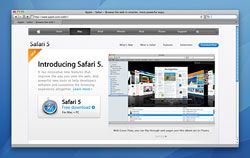Safari to add Do Not Track
Apple joins Mozilla and Microsoft in targeting browser ad-tracking systems; Google remains unconvinced

According to the Wall Street Journal, Apple will add a 'Do Not Track' feature to the next major revision of Safari. The feature was discovered in a recent build of the next version of Mac OS X, Lion, and enables users to opt out of online ad-tracking. Critics have argued such features are problematic, since they are a request rather than enforcement, requiring advertising services to cooperate. However, developers such as Brian Kennish have praised this approach, calling it "elegant to developers", despite its need for regulation.
As reported in .net magazine issue 213, Mozilla led the way with this feature, integrating it into Firefox 4. A spokesperson told us at the time that browsers "have a fundamental role to play in the user privacy discussion," and believed Mozilla's approach will give "better insight and control into online tracking and more transparency into both data collection methods and into how their data is stitched together into a profile". Internet Explorer 9 subsequently followed suit, but Google only provides a Keep My Opt-Outs add-on extension for Chrome, rather than integrating the functionality directly into the browser.
With Google's business model partly reliant on ad sales driven by tracking, and Google having already confirmed that it has no plans to add a native Do Not Track feature to Chrome, we asked the company if its stance was benefiting advertisers alone, at the expense of the end user. Ollie Rickman, head of communications, Google UK & Ireland, argued that standardisation was largely to blame in Google not following Mozilla's lead: "The idea of 'Do Not Track' is interesting, but there doesn't seem to be wide consensus on what 'tracking' really means, nor on how new proposals could be implemented in a way that respects people's current privacy controls."
Rickman added that Google is at least "encouraged that standards bodies are working on these issues," and "will continue to be involved closely". He also said Keep My Opt-Outs for Chrome "already works to permanently opt users out of most ad profiling, and will be available soon as an extension for Firefox and Internet Explorer". Kennish had previously referred to Google's position as "a cynical PR play", claiming Keep My Opt-Outs was something "carried in Google's back pocket and pulled out anytime the conversation turns to privacy". With that in mind, it will be interesting to see how closely Google remains involved in Do Not Track and whether it will eventually feel compelled to add the feature to its web browser, especially if other browsers have already affected Google's business by adding it to theirs.
Get the Creative Bloq Newsletter
Daily design news, reviews, how-tos and more, as picked by the editors.

Thank you for reading 5 articles this month* Join now for unlimited access
Enjoy your first month for just £1 / $1 / €1
*Read 5 free articles per month without a subscription

Join now for unlimited access
Try first month for just £1 / $1 / €1
The Creative Bloq team is made up of a group of design fans, and has changed and evolved since Creative Bloq began back in 2012. The current website team consists of eight full-time members of staff: Editor Georgia Coggan, Deputy Editor Rosie Hilder, Ecommerce Editor Beren Neale, Senior News Editor Daniel Piper, Editor, Digital Art and 3D Ian Dean, Tech Reviews Editor Erlingur Einarsson, Ecommerce Writer Beth Nicholls and Staff Writer Natalie Fear, as well as a roster of freelancers from around the world. The ImagineFX magazine team also pitch in, ensuring that content from leading digital art publication ImagineFX is represented on Creative Bloq.
